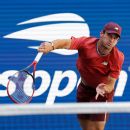Djokovic roars back from 2-set hole to top Djere
Everyone should know by now to never count out Novak Djokovic. No matter how big a deficit he faces. No matter how poorly he might be playing.
And so it made sense that Djokovic would come all the way back from a two-set deficit to beat Laslo Djere 4-6, 4-6, 6-1, 6-1, 6-3 in the third round of the US Open, avoiding what would have been his earliest exit there since 2006.
“Of course, winning a match is always better than losing a match. It’s as simple as that,” said Djokovic, who next faces Borna Gojo, a 25-year-old qualifier from Croatia making his US Open debut. “I think the message is sent to the rest of the field that I’m still able to play five sets deep at night, and coming from two sets down always sends a strong message to the future opponents.
“But at the same time, I’m not really wanting to be in this position, to be honest. I prefer a straight-set win. So hopefully I can get back on that track in the next match.”
This one began under the lights in Arthur Ashe Stadium on Friday night and did not wrap up until more than 3½ hours later, concluding just after 1:30 a.m.
It was Djokovic’s eighth career victory after dropping the opening two sets of a match. Before Friday, Djokovic was 1-6 at the US Open when losing the first two sets, with the lone win coming against Roger Federer in the 2011 semifinal.
Once he seized control, Djokovic held on tight and never let Djere recover. In the crucible of a fifth set, Djokovic was cool as can be, collecting 12 of the initial 14 points to leave no doubt how this would go.
Djokovic, who improved to 38-11 in five-setters over his career, has won three of his men’s record 23 Grand Slam titles at Flushing Meadows and been the runner-up a half-dozen times, including in 2021. The 36-year-old from Serbia did not compete in the US Open last year because he couldn’t travel to the United States as a foreigner who is not vaccinated against COVID-19; that rule was lifted in May.
He is seeded No. 2 in New York behind Carlos Alcaraz, and pretty much everyone has been expecting the two of them to meet for the championship on Sept. 10. That appeared as if it might be derailed by Djere, a 28-year-old who is also from Serbia and was seeded 32nd.
“Trust me,” Djokovic said, “it was nerve-racking all the way until the last shot.”
This would have been by far the biggest victory of Djere’s career. He was trying to reach the fourth round at a Grand Slam tournament for the first time and came into Friday with an 0-6 record at majors against opponents ranked in the top 10.
Perhaps the intimidation factor that favors Djokovic in most matchups simply wasn’t there. They have known each other for years, practicing together, spending time as Davis Cup teammates and competing on tour as a doubles pairing.
When it ended, they met at the net for a hug, and Djokovic applauded as Djere walked off the court.
With the temperature down around 65 degrees, Djere came out strong. He was outlasting Djokovic on the lengthiest baseline exchanges.
“Everything was kind of in his striking zone,” Djokovic said. “It was very hard for me to find a solution.”
Across the first two sets, Djere claimed 28 of 44 points that lasted five or more strokes. Djokovic’s footwork seemed a bit off. His control of the ball did too. He would throw up his arms after some misses or grimace after others.
When Djokovic halfheartedly pushed a forehand return long to end the second set, the match was 1 hour, 33 minutes old, and everything was going Djere’s way.
As he often does when trailing, Djokovic headed to the locker room between sets to change his clothes. And as he so often does, Djokovic came out a different player.
“I did a little pep talk in the mirror. I kind of laughed at myself, because I was so … agitated,” Djokovic said. “I forced myself to … lift the spirits.”
He finally broke for the first time all evening to lead 2-0 in the third set, winning a 27-stroke point when Djere capitulated with a forehand into the net.
Djokovic flapped his arms and waved his hands to ask the crowd to salute him. That set would be over in a blink.
“Once I got the break in the third, I thought, ‘OK. I have a shot. I have a chance. I might as well go after it,'” he said.
Djokovic broke to begin the fourth, using his trademark defensive skills to prolong a point until snapping a forehand winner as Djere lost his footing.
Djokovic turned toward his coach, Goran Ivanisevic, and the rest of his entourage in the stands, shouting and punching the air twice.
Later in that set, Djokovic ranged so far to his right to extend a point that he was wide of the doubles alley, and Djere — likely surprised to see the ball headed back at him — missed a forehand.
That was part of a pattern that would be repeated down the stretch. Message sent.
The Associated Press contributed to this report.



